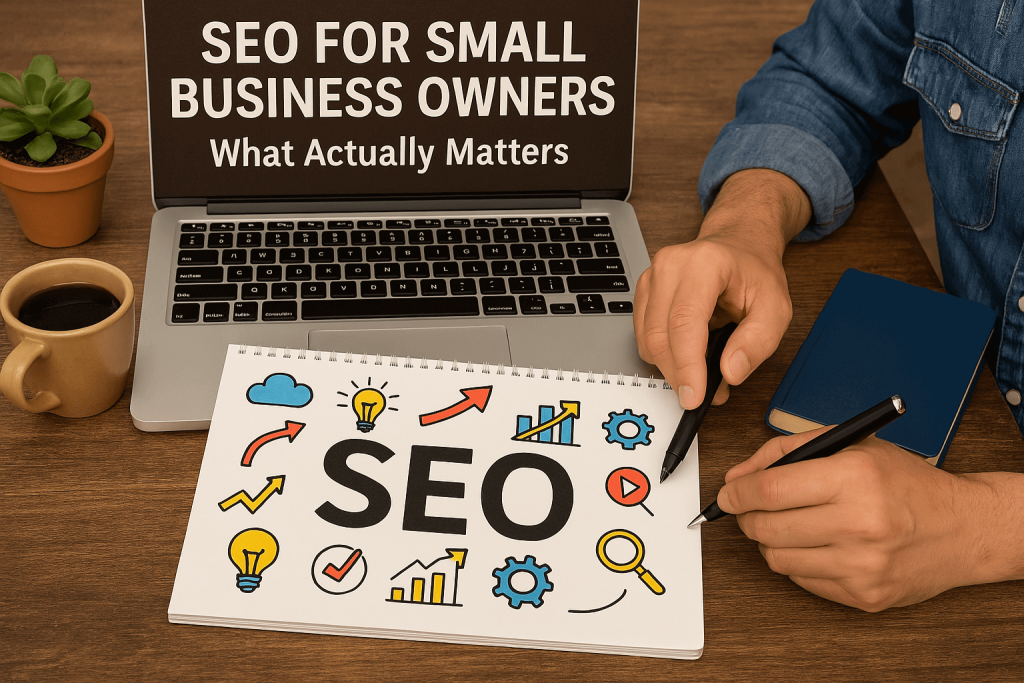
In today’s digital-first world, having a great product or service isn’t enough—you also need to be found. For small business owners, that means showing up where people are looking: Google. But let’s be honest—SEO (Search Engine Optimization) often sounds overwhelming, full of jargon, and endless tactics that seem more suited to big corporations with marketing departments, not small teams juggling day-to-day operations.
The truth? SEO doesn’t have to be complicated. When done right, it’s one of the most cost-effective ways to attract local customers, build credibility, and grow your business sustainably. But what actually matters when it comes to SEO? Not every tip or trend is worth your time—and wasting effort on the wrong things can leave you frustrated and invisible online.
In this guide, we’re cutting through the noise and diving into the core SEO strategies that move the needle for small business owners. Whether you’re a solo tradie, café owner, local accountant, or boutique store, this is your roadmap to building visibility and attracting customers—without the fluff.
1. Start With Your Website’s Foundation (Technical SEO)
Before you worry about keywords and blog posts, your website needs a solid foundation. Think of it like a house: if the plumbing’s bad, it doesn’t matter how great the decor is.
What actually matters:
- Mobile-Friendliness: Over 60% of searches happen on mobile. If your site isn’t responsive, Google (and users) will ignore you.
- Page Speed: Slow sites lead to high bounce rates. Leverage platforms such as Google PageSpeed Insights to pinpoint performance bottlenecks and fine-tune your website for faster, smoother user experiences.
- Secure Connection (HTTPS): It’s a ranking factor. If your URL starts with http://, get an SSL certificate—most hosting providers offer one free.
- Proper URL Structure: Clean, keyword-friendly URLs like yourdomain.com/plumbing-services are better than yourdomain.com/page?id=123.
Takeaway: If your site isn’t technically sound, fix that before doing anything else. It’s the difference between building on sand vs. concrete.
2. Local SEO is Your Golden Ticket
Most small businesses serve a specific geographic area. That’s where local SEO becomes your superpower. You’re not aiming to outrank nationwide giants — your real advantage lies in becoming the go-to choice within your local community.
What actually matters:
- Google Business Profile (formerly Google My Business): Claim it. Optimize it. Add photos, hours, services, and updates.
- NAP Consistency: Your Name, Address, and Phone number must be the same across every listing—website, directories, and social media.
- Local Citations: Get listed on directories like Yelp, YellowPages, True Local, Hotfrog, etc. These build local trust.
- Reviews: Encourage happy customers to leave reviews. Respond to all reviews (even the negative ones) professionally.
Takeaway: If someone searches “plumber near me” and you’re not showing up, you’re invisible. Fix that with a killer local SEO strategy.
3. Content That Solves Problems
Google rewards content that helps users. You don’t need to write daily blogs—just focus on helpful, relevant, and locally focused content.
What actually matters:
- Service Pages: Every service you offer deserves its page. “Carpet Cleaning” and “Upholstery Cleaning” should not share a page.
- Location Pages: If you serve multiple suburbs or cities, create individual pages like “Electrician in Parramatta” or “Mechanic in Blacktown”.
- FAQs & How-To Guides: Think like your customer. “How often should I service my air conditioner?” — That’s a great blog post.
- Keep it Human: Don’t write for search engines. Write like you’re talking to a real customer in your shop.
Takeaway: Quality trumps quantity. Focus on user-first content that answers real questions and targets real problems.
4. On-Page SEO (The Secret Sauce)
This is where keywords, titles, and structure come in. Clear and effective on-page SEO helps Google understand what your content is about.
What actually matters:
- Title Tags & Meta Descriptions: Craft compelling titles and descriptions that include your target keywords and entice clicks.
- Headings (H1, H2, H3): Use them to structure your content. Your primary keyword belongs in the H1 heading to signal the page’s focus to both users and search engines.
- Keyword Placement: Naturally place your primary keyword in the title, first paragraph, and a couple of times throughout.
- Alt Text for Images: Describe your images properly. It’s good for accessibility and SEO.
Takeaway: On-page SEO is your chance to signal clearly to Google what each page is about. Don’t skip it.
5. Backlinks: Still Important, But Quality Over Quantity
Backlinks (links from other sites to yours) are like online votes of confidence. But for small businesses, it’s not about going viral—it’s about earning trust from relevant sources.
What actually matters:
- Local Backlinks: Get listed in local blogs, business chambers, or industry-specific directories.
- Partnerships: If you work with suppliers, vendors, or fellow businesses, ask if they’ll link to your site.
- Press & Community: Sponsor a local event? Run a workshop? Reach out to local news sites—they often link to participants.
Takeaway: Don’t create spammy backlinks or buy links. Focus on real relationships and community involvement.
6. Track Your Progress, Don’t Just Guess
Many small businesses “do SEO” blindly without knowing what’s working.
What actually matters:
- Google Analytics: Tracks the journey of your audience — from how they land on your site to what actions they take.
- Google Search Console: Tells you what keywords you’re ranking for and alerts you to issues.
- Call Tracking: This helps you attribute phone leads to SEO if you’re using a call-tracking number.
- Simple KPIs: Focus on what matters—more calls, form submissions, store visits—not just “rankings”.
Takeaway: You can’t improve what you don’t measure. Even basic tracking can make a huge difference.
Wrapping Up: SEO is a long-term journey, not an overnight fix
SEO for small business owners isn’t about gaming the algorithm—it’s about showing up when your customers need you.
Focus on:
- Building a solid website.
- Optimizing for your local area.
- Creating helpful content.
- Earning trust through reviews and partnerships.
If you do those things consistently, SEO stops being a mystery—and starts being a meaningful growth strategy.
Need help with SEO for your small business? Whether you’re just starting out or want to improve your online visibility, a targeted SEO strategy tailored to your goals can make all the difference.
Why SEO Matters More Than Ever for Small Businesses
The digital landscape is constantly evolving, but one truth remains: visibility is everything. If your potential customers can’t find you online, you might as well not exist. For small businesses competing in crowded markets, SEO (Search Engine Optimization) has shifted from a “nice-to-have” to a non-negotiable growth strategy—and here’s why.
1. People Search Before They Buy
Whether someone’s looking for a local plumber, a cozy café nearby, or a new yoga studio, their journey almost always starts with a Google search. Studies show that over 90% of online experiences begin with a search engine. If your business isn’t showing up in those results, your competitors are happily collecting your leads.
2. Organic Traffic Builds Long-Term Value
Paid ads might deliver quick traffic—but the moment you stop paying, that visibility disappears. SEO, on the other hand, is an investment in long-term, sustainable traffic. When done right, your website becomes a 24/7 salesperson, attracting visitors even while you sleep.
3. Local Search Is Exploding
With the rise of mobile devices and “near me” searches, local SEO has become a game-changer for small businesses. People aren’t just searching—they’re ready to act. More than 75% of local searchers don’t wait long — they visit a nearby store to search within 24 hours. Ranking in those local results can mean the difference between a quiet day and a fully booked one.
4. Trust and Credibility Start With Google
Let’s face it—people trust Google. If your business shows up on the first page of search results, you’re automatically seen as more credible and professional. Reviews, local listings, and quality content not only boost your SEO but also build trust with potential customers before they even visit your site.
WebXpts.com is an expert SEO agency in Dubai that specializes in helping small business owners enhance their online presence and drive growth. With a deep understanding of the unique challenges small businesses face, we focus on delivering tailored SEO strategies that matter most. We emphasize the importance of local SEO, ensuring your business ranks well in local searches, which is crucial for attracting nearby customers. At web experts, we also prioritize user experience, ensuring websites are optimized for speed, mobile responsiveness, and clear navigation, which are key factors in search engine rankings. By focusing on quality content, keyword optimization, and building organic backlinks, we ensure that small businesses not only increase visibility but also engage their target audience effectively, leading to sustainable long-term growth. For small business owners in Dubai, we provide an invaluable partner in mastering SEO and standing out in an increasingly competitive digital landscape. We also provide website design and website development services in Dubai.

For Advertisement

For Advertisement

For Advertisement

For Advertisement

